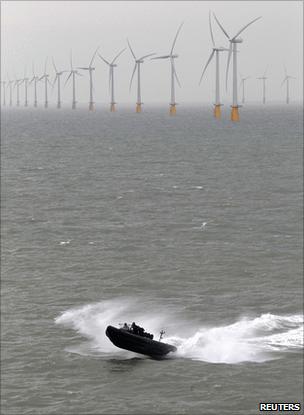UK 'needs domestic wind energy industry'
- Published

Wind turbine manufacture in the UK would help bring costs down, the report says
The UK government should build a home-grown wind power industry if it wants to meet EU targets on renewable energy, a report concludes.
The UK Energy Research Centre (UKERC) says this would significantly bring down the costs of offshore wind power.
The price of building offshore wind farms in has doubled in five years.
The report, Great Expectations, external, suggests that the UK can learn from countries such as Spain that recently boosted their wind power industries.
Analysts suggest that in order to meet its EU target of producing 15% of its energy through renewables by 2020, the UK will need to have 15-20 gigawatts (GW) of wind energy capacity installed offshore.
Despite some recent developments such as the opening of the Thanet wind farm off the north Kent coast - the biggest offshore wind farm in the world - the UK's current total capacity offshore is just under 1.5GW.
Costs of all electricity generation have risen markedly in recent years, but the highest rise has been seen for offshore wind, says UKERC.
This is accounted for by increasing raw material costs, currency movements (particularly the pound's fall against the euro), bottlenecks in the supply chain and construction in progressively more challenging sites.
Stimulating a UK supply chain would, says UKERC, be instrumental in keeping costs down.
"The UK's support system offers a generous subsidy, but may not do enough to build confidence in the companies making components, providing vessels or delivering support services," said Robert Gross, the report's lead author and UKERC co-director.
"At the moment, it's quite uncertain where the coalition in going in terms of providing the kind of support to the supply chain that we were beginning to see under Labour," he told BBC News.
At the moment, about 80% of the materials and services involved in constructing an offshore wind farm are imported.
Tom Foulkes, director-general of the Institution of Civil Engineers, backed the UKERC's conclusions.
Offshore wind could become a major player in the UK renewables portfolio, but this would "require massive development in a relatively narrow timeframe," he said.
"Government will need to provide clear leadership, ensuring the regulatory framework and fiscal mechanisms are fit for purpose and the supply chain is developed concurrently to make the UK a hub for offshore design and manufacturing."
Bright outlook
The government says it is intent on using grants to help build a domestic supply chain.
A recent batch of grants saw £10m go to companies that are developing turbines, bearings, cabling and other equipment.
"The UK has incredible offshore wind resources and this sector will play a key part in improving security of supply and decarbonising our electricity generating system," said a spokesman for the Department of Energy and Climate Change (Decc).

Despite planning concerns, the UK is speeding ahead of other nations on offshore wind
"We are also keen to realise the economic benefits to the UK - some commentators have estimated between 45,000 and 70,000 jobs could be created in the UK supply chain for offshore wind."
The UKERC report also notes that the planning system can entail a period of up to nine years between applying for and opening an offshore wind farm.
Of 15 farms approved in the 2001 licensing round - "Round One" - only five came on stream within five years, while four have been withdrawn or lie dormant.
The previous government pledged to streamline the planning process through a new body, the Infastructure Planning Commission; but that has been scrapped.
Instead, the coalition has pledged to introduce "a new rapid and accountable system where ministers, not unelected commissioners, will take the decisions on new infrastructure projects".
But Dr Gross said the government had yet to fill in the details on how that will work.
"There's also a need to do these things holistically," he said.
"There's no point in getting planning consent for a large wind farm out at sea if a local authority can then block an application for an electricity substation on shore."
However, UKERC says the future is optimistic for offshore wind. It suggests costs may have reached a plateau, and will come down if the "right incentives" are put in place.
In the pipeline now are offshore wind farms that would dwarf the 300MW capacity installed at Thanet.
Triton Knoll off the Lincolnshire coast and the Argyll Array west of the Isle of Mull are among the prime contenders to become the first sites to host a 1GW farm, while the collective potential capacity of sites offered under the government's Round Three, in 2008, is about 32GW.
These giant farms may begin to come onstream in 2015.
Richard.Black-INTERNET@bbc.co.uk
- Published23 September 2010
- Published18 August 2010
- Published10 August 2010
- Published25 July 2010
- Published15 July 2010